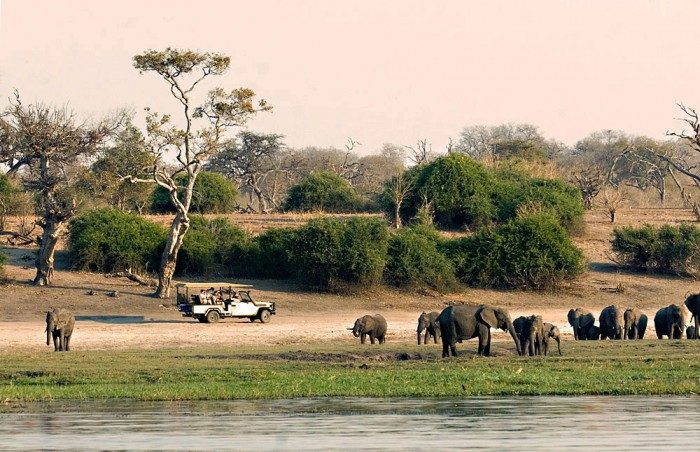


Tracking the presidential herd
WAVES of dust spiralled into the air in a distance as we embarked on an early morning game drive in Hwange National Park — the cradle of a centuries old vibrant ecosystem that has evolved into a must-visit spot for nature lovers. In the nearby valley, turmoil raged as a teen lion ambushed a herd of unsuspecting impalas in a raid that would be his early breakfast.
Under the leafless twigs of Mopani trees that are scattered across vast sandy patches of soil, a massive mixed herd of herbivores stretched as they woke up to begin another difficult day in one of southern Africa’s most arid regions. Food and water were scarce, and for thousands of these vegetarians, their predicament was two-fold.
They looked out for hungry predators that frequently raided them and snatched their weak siblings, at the same time moving over long distances in search of better pastures. This predicament united them against harm, I thought. Our attention had shifted to the imposing dust, so our guide had to quickly intervene.
“It is not a storm, it’s just a herd of buffaloes,” he said.
It was the start of an exploration that would take us across rolling plains, to track a rare lone rhino facing near extinction in this part of the world, and to man-made water pools where we played witness to a blazing tug-of-war for carcasses. Here, a pack of lions had pounced on a young buffalo but a colony of hyenas had, in turn invaded the area to chase them away and feast on the loot — an experience that left me in doubt about the lion’s famed “king of the jungle” status.
“You people are very lucky,” said our guide.
“This is a rare experience. You can’t track and find a rhino, see a fresh kill and witness a war over carcasses in one trip,” he said.
“We will now be hunting for the presidential herd,” he said.
He took me by surprise. President Robert Mugabe’s elephants? We combed through the valleys, leafless twigs, dry grasses that formed the chin of the sun-baked soils and several water points until we came face to face with the 450-strong herd.
These elephants have been habituated to human beings, particularly in vehicles, and they move in groups of about 15 extended families, spending most of their time patrolling the vast estate.
I was astounded by our guide’s bravery. We held our breath as he weaved the 4×4 deeper into the centre of the awesome creatures. We were in the back of beyond, and any mishap would leave us at the mercy of the mammals. Mothers brought kids to our vehicle. I was terrified.
Then I was off to Chobe National Park
A tarpaulin canopy protected us from the scorching sun in a small, ramshackle boat on the intimidating banks of the crocodile infested Chobe River. It was August 29, 2013 in the Kasane resort town in north-eastern Botswana. Powerful waves relentlessly pounded the light watercraft which nodded submissively after a Botswana Defence Forces anti poaching vessel sliced through the still waters at breakneck speed.
The currency swept underneath its bream shaped belly while we struggled to get to grips with its uncontrolled shaking. It was a good start to a memorable exploration on one of southern Africa’s longest rivers, a rare opportunity for close range encounters with a wide range of fauna and flora.
Tourists can visit Chobe National Park from Victoria Falls. It is a one and half hours’ drive through Kazungula Border Post.
On the eventful day filled with both excitement and near fatal confrontations with deadly wild beasts, we would later be interrupted by a dangerously charging hippo determined to protect a baby, with all of us least expecting that we had orbited into harm’s way.
The hippo plunged into the waters from the edge of Sedudu Island, strolled knee-deep into muddy shores and bellowed before cutting deep into the river while angling for a strike. Sedudu means “Hippo” in the local language. Our boat quaked and stunted, and the young captain panicked as he attempted to flee. But with each ticking second, fate was propelling us towards a lock down with the fast approaching mammal, notorious for striking small boats belly up when its peace is disturbed.
The captain tried to take off again, but the old engine muffled. Then it burst into high speed just as the rest of the six of us had resigned. One hundred metres away, we skidded to a halt as the hippo emerged on our previous position. A few minutes earlier, our captain had narrowly avoided a fatal collision with a defiant crocodile that had drifted into our path, rolling past the triangle-shaped hull of the boat before he steered sideways to avoid a potentially bloody contact with the propeller.
We had watched the croc on the edge of the river snoozing, its jaws wide open, and its impressive teeth and ugly mouth on display. Chobe River’s ecosystem is pregnant with mysteries-land and water animals fiercely compete for space. In Kasane, or Chobe the river becomes a twisting, broad arm of water snaking its way through swampland.
newsdesk@fingaz.co.zw